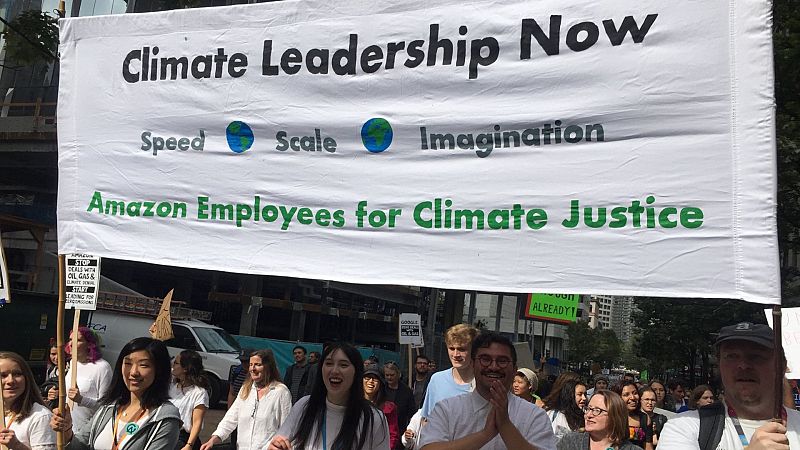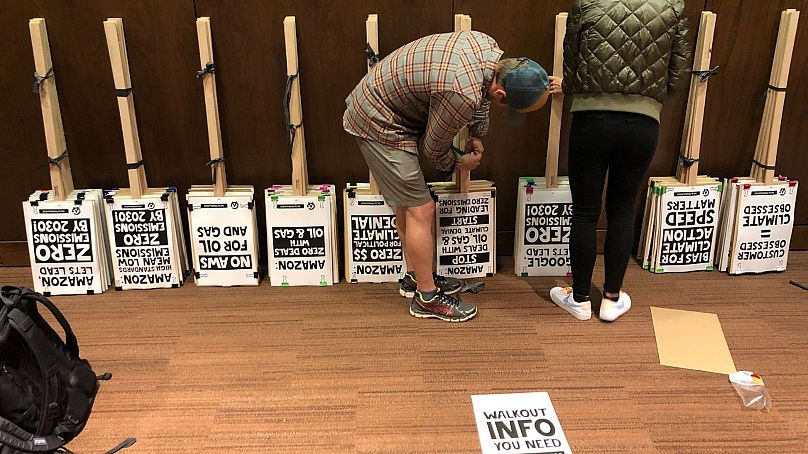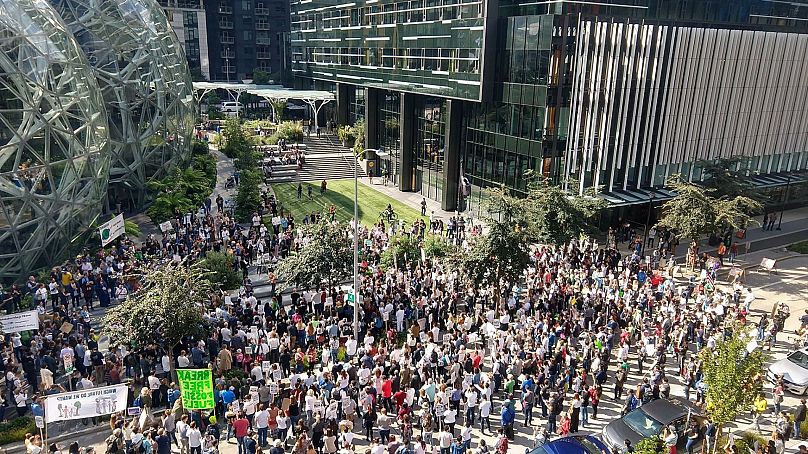Black Friday: Amazon workers striking over company's broken climate promises

Most Amazon employees think senior leadership is misleading the public about the company’s environmental impact, a new survey reveals. The research has been launched ahead of the biggest retail weekend of the year.
From Black Friday until Cyber Monday (29 November to 2 December), Amazon workers from 20 countries, including the United States, United Kingdom and Turkey, will be striking in the hope of derailing our holiday shopping.
Over 80 organisations working towards labour, tax, climate, data and racial justice have come together for the ‘Make Amazon Pay’ campaign, which is organising these global protests.
“This isn’t just about Amazon’s failures,” says Eliza Pan on behalf of the group Amazon Employees for Climate Justice (AECJ), “this is about Amazon setting the standards for how corporations across the world measure emissions and take responsibility for their pollution.
For the last few years, Amazon’s employees have been fuelled by investigative reporting that backs up their own suspicions about the online retailer’s commitment to sustainability and human rights.
“This matters because Amazon is shaping our economies and our society globally,” Pan adds.
Amazon workers care about the company’s environmental efforts
It’s a misconception that Amazon workers don’t care about sustainability - most want the retail giant to do better, according to the independent employee survey coordinated by the AECJ.
71 per cent of respondents thought that climate issues weren’t a consistent guiding force or key metric for Amazon’s business decisions.
Over 800 employees from both the Seattle headquarters and from other Amazon hubs responded.
This is stark data, considering the company adopted a climate pledge in 2019 after thousands of workers walked out during a global climate strike.
“We’ve gotten Amazon to make changes like the Climate Pledge and investing in some electric delivery vans because we organised as workers to pressure senior leadership,” says Pan.
But most Amazon employees don’t think this is enough, Pan highlights, which is why the campaign group released an ‘unsustainability report’ earlier this year, which featured a ‘summary the executives aren’t giving you’.
Amazon is backtracking on net zero commitments
Despite the company’s 2019 commitment to reach net zero emissions by 2040, Amazon’s annual carbon emissions have since grown by 35 per cent.
The AECJ blames this on the company’s lack of interim reduction targets and the senior leadership’s prioritisation of the bottom line.
Amazon has also backtracked on several other green goals.
The AECJ says that Amazon deleted an original blog post that highlighted its plans to make half of its shipments net zero by 2030.
What’s more, they say the retailer has dramatically undercounted its carbon pollution because it only includes emissions of Amazon-branded products, which are just one per cent of sales.
Amazon also fails to count the emissions of products sold by third parties on its website, despite this making up 60 per cent of its sales.
In August 2023, Amazon was removed from the UN-backed Science Based Targets Initiative, which validates net zero plans, after failing to meet the evidence-based standards.
89 per cent of employees feel Amazon should hold itself accountable for carbon emission accounting, just like other retail companies such as Target and Walmart already do, the survey further reveals.
But that’s not all. Amazon is providing AI and other services to fossil fuel companies, which, in turn, help them extract more oil and gas - and over half of employees do not support this activity.
Overconsumption is being fuelled by Prime Day events, warn Amazon workers
Sales across retail are expected to spike over the weekend, thanks to Black Friday’s much-touted deals ahead of Christmas.
But is promoting overconsumption and buying from Amazon part of the problem?
“If you care about the problem of overconsumption, we want to urge you to think about how this isn’t just a problem of individuals buying too much stuff. It’s actually a problem of corporations like Amazon investing billions into getting you to buy more stuff,” explains Pan.
Every year, Amazon emits emissions equivalent to an individual taking a long-haul flight every day for 94,000 years, ACEJ research shows.
“Think about how Amazon INVENTED (sic) a new shopping holiday called Prime Day, and now there is Prime Day multiple times a year. Think about how corporations invented Black Friday and how Amazon has turned it into a game of ‘hunting for deals’.”
Pan goes on to explain further: “The solution to this isn’t just individual. The solution needs to be workers coming together to demand better from their companies.”
‘Not in our neighbourhood!’: The Amazon paradox
Another notable survey opinion is that nearly one-third of workers said that they wouldn’t feel comfortable if Amazon were to open a new warehouse or delivery hub in their community.
The reason for this, the AECJ says, is because these warehouses create massive amounts of air pollution - and these disproportionately affect communities of colour.
For example, 40 per cent of the company’s global goods pass through the Inland Empire region in Southern California, which has the worst ozone pollution in the US.
The Californian county of San Bernardino is home to many of Amazon’s fulfilment centres and has an average of 175 days of ‘unhealthy air’ each year.
Don’t just rethink your shopping habits, organise.
If you want to help reduce overconsumption, Pan encourages individuals to establish and join sustainability-focused worker organisations in their own workplaces.
“Don’t just think about reducing your personal shopping list - instead, think about how you can get your coworkers to join you in demanding that your company leadership reduce its emissions or energy use or pollution or waste.”
“And if you work at Amazon, get involved with our organising work!” Pan adds.



